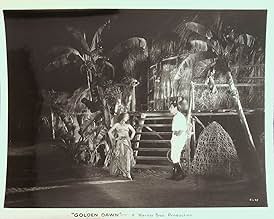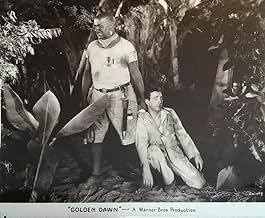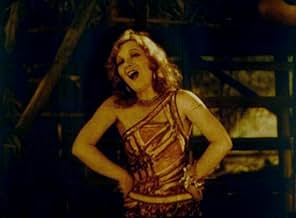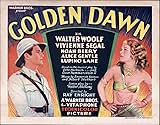"Golden Dawn" is a musical operetta released by Warner Brothers, photographed entirely in Technicolor, and starring Walter Woolf King and Noah Beery. The film is based on the semi-hit stage ... Read all"Golden Dawn" is a musical operetta released by Warner Brothers, photographed entirely in Technicolor, and starring Walter Woolf King and Noah Beery. The film is based on the semi-hit stage musical of the same name by Oscar Hammerstein II and Otto Harbach."Golden Dawn" is a musical operetta released by Warner Brothers, photographed entirely in Technicolor, and starring Walter Woolf King and Noah Beery. The film is based on the semi-hit stage musical of the same name by Oscar Hammerstein II and Otto Harbach.
- Director
- Writers
- Stars
Walter Woolf King
- Tom Allen
- (as Walter Woolf)
Sôjin Kamiyama
- Piper
- (as Sojin)
Eduardo Cansino
- Secondary Supporting Role
- (uncredited)
Nigel De Brulier
- Hasmali - the Witch Doctor
- (uncredited)
Nick De Ruiz
- Napoli
- (uncredited)
Frank Dunn
- Secondary Supporting Role
- (uncredited)
Ivan F. Simpson
- Secondary Supporting Role
- (uncredited)
- Director
- Writers
- All cast & crew
- Production, box office & more at IMDbPro
Featured reviews
10woid
and one of the funniest movies I've ever seen.
Not intentionally, though.
It's an operetta set at a camp for English prisoners being held by the Germans somewhere in the African jungle. There are dozens of native extras, all of them black actors, whose main function in the story is to prostrate themselves toward whichever white lead happens to be singing in the vicinity.
And yes, all of the lead actors are white, a little awkward since many of them are playing natives of the same tribe as the actually black extras. Their skin tones range from burnt cork (Noah Beery) to snow white (the golden Dawn herself). The plot revolves around whether the obviously white Dawn is really black. I can't tell you how it comes out -- that would be a spoiler.
Dawn's mother, a slightly darker shade of makeup, wears earrings and pearls and sort of resembles Margaret Dumont.
Speaking of whom, the male lead is played by Walter Woolf, who, as Walter Woolf King, plays the villain tenor Rodolfo Lassparri in "A Night At The Opera." When this, uh, dawned on me, I actually shouted out, just like Groucho as Otis B. Driftwood, "Lassparri?!?!?!"
This is racism too ridiculous to be objectionable. Instead, like the (intentional) loony racial stereotypes in "Blazing Saddles," it's hysterical.
Noah Beery (brother of Wallace, father of Jr.) plays Shep Keyes, who speaks and sings in an exaggerated stereotypical southern black dialect, full of "gwines" and so on. Is he supposed to be American? African? No idea. Then there's the native second female lead character, apparently (made up to be) African, but doing the same shufflin' accent as Beery. Is it just me, or does she bear a startling resemblance to Andrea Martin?
There are so many little delights, other absurd characters and "comic" subplots, moments to cherish. The Whip song! My Bwana! A Tigah! The final, shocking, revelations! Why are you reading this? Go forth, do whatever it takes to find a copy of this movie, and watch it!
Not intentionally, though.
It's an operetta set at a camp for English prisoners being held by the Germans somewhere in the African jungle. There are dozens of native extras, all of them black actors, whose main function in the story is to prostrate themselves toward whichever white lead happens to be singing in the vicinity.
And yes, all of the lead actors are white, a little awkward since many of them are playing natives of the same tribe as the actually black extras. Their skin tones range from burnt cork (Noah Beery) to snow white (the golden Dawn herself). The plot revolves around whether the obviously white Dawn is really black. I can't tell you how it comes out -- that would be a spoiler.
Dawn's mother, a slightly darker shade of makeup, wears earrings and pearls and sort of resembles Margaret Dumont.
Speaking of whom, the male lead is played by Walter Woolf, who, as Walter Woolf King, plays the villain tenor Rodolfo Lassparri in "A Night At The Opera." When this, uh, dawned on me, I actually shouted out, just like Groucho as Otis B. Driftwood, "Lassparri?!?!?!"
This is racism too ridiculous to be objectionable. Instead, like the (intentional) loony racial stereotypes in "Blazing Saddles," it's hysterical.
Noah Beery (brother of Wallace, father of Jr.) plays Shep Keyes, who speaks and sings in an exaggerated stereotypical southern black dialect, full of "gwines" and so on. Is he supposed to be American? African? No idea. Then there's the native second female lead character, apparently (made up to be) African, but doing the same shufflin' accent as Beery. Is it just me, or does she bear a startling resemblance to Andrea Martin?
There are so many little delights, other absurd characters and "comic" subplots, moments to cherish. The Whip song! My Bwana! A Tigah! The final, shocking, revelations! Why are you reading this? Go forth, do whatever it takes to find a copy of this movie, and watch it!
True, as a film, this is ludicrous, with "native African" Noah Beery speaking in a combination of U.S. Southern Black ("I'se gwine...")and cowboy dialects ("I'm a gonna pump ya plum full of lead")and some horrendous choreography. But there is some beautiful music from perhaps the greatest composer of Viennese operetta: Emmerich Kalman. This movie is based on Kalman's operetta "Golden Dawn," which premiered in New York in 1927. Especially noteworthy are two Kalman songs: "Just We Two" and a lovely ballad "You Are the One." To fully enjoy the music, one must,of course, ignore the fact that the lilting Viennese melodies and sometimes-Hungarian harmonies seem just a bit out of place in Africa.
...and isn't boredom the worst cinematic experience one can have anyways? I watched Golden Dawn expecting a bore-fest full of static performances and wretched operatic screeching, having heard its reputation as the worst surviving movie musical ever made. Instead I experienced something so campy it is worthy of TCM Underground's Friday night cult film festivals.
This film definitely did not turn out like Warner Brothers expected, I'm sure. It failed at the box office and is today a very unintentionally funny film. The film is set during the first World War in Africa. It is about a native girl, Dawn (Vivienne Segal), who has supposedly been blessed by the gods to appear white, thus marking her as the future bride of the native's god - a statue that appears to be a giant likeness of Mr. Bill from the old 70's skits on Saturday Night Live. A British soldier loves Dawn, but their love is thwarted at every turn both by the fact that the occupying Europeans don't want any trouble with the natives, which they'd have if Tom Allen (Walter Woolf King) eloped with the bride of the native god, and by Shep Keyes, a native bully and strong man who wants Dawn for himself.
Shep (Noah Beery) is supposed to be an African native, yet his name and his accent are purely Gone with the Wind. Plus his black-face makeup is very obviously melting off of his body through his clothing under the hot Technicolor lights, but nobody seems to notice.
There are a large group of civilian Americans and Europeans in the story, and the reason for their presence in this remote African village is never explained. Neither is any reason given as to why they all speak like they're from Queens. One of the things in this film that does work as funny and probably intentionally so is the wiry anemic Ned Sparks-like Lee Moran as Blink and Marion Byron as Joanna, Blink's rough and bossy girlfriend. The one number that works in this film is their rendition of the Song "A Tiger", which Joanna certainly is and Blink definitely is not.
This film, made in 1930, is still using title cards to transition between scenes, something that was still common in the late Vitaphone era. However, even here there are laughs to be found. One title card reads "There was no joy among the natives. A draught was destroying them." As there is no mention of beer or wind in this film, I can only assume the title card writer meant "draught" to be "drought".
For a little over an hour of campy fun in the tradition of "The Dueling Cavalier" in Singin in the Rain, you just can't beat this one.
This film definitely did not turn out like Warner Brothers expected, I'm sure. It failed at the box office and is today a very unintentionally funny film. The film is set during the first World War in Africa. It is about a native girl, Dawn (Vivienne Segal), who has supposedly been blessed by the gods to appear white, thus marking her as the future bride of the native's god - a statue that appears to be a giant likeness of Mr. Bill from the old 70's skits on Saturday Night Live. A British soldier loves Dawn, but their love is thwarted at every turn both by the fact that the occupying Europeans don't want any trouble with the natives, which they'd have if Tom Allen (Walter Woolf King) eloped with the bride of the native god, and by Shep Keyes, a native bully and strong man who wants Dawn for himself.
Shep (Noah Beery) is supposed to be an African native, yet his name and his accent are purely Gone with the Wind. Plus his black-face makeup is very obviously melting off of his body through his clothing under the hot Technicolor lights, but nobody seems to notice.
There are a large group of civilian Americans and Europeans in the story, and the reason for their presence in this remote African village is never explained. Neither is any reason given as to why they all speak like they're from Queens. One of the things in this film that does work as funny and probably intentionally so is the wiry anemic Ned Sparks-like Lee Moran as Blink and Marion Byron as Joanna, Blink's rough and bossy girlfriend. The one number that works in this film is their rendition of the Song "A Tiger", which Joanna certainly is and Blink definitely is not.
This film, made in 1930, is still using title cards to transition between scenes, something that was still common in the late Vitaphone era. However, even here there are laughs to be found. One title card reads "There was no joy among the natives. A draught was destroying them." As there is no mention of beer or wind in this film, I can only assume the title card writer meant "draught" to be "drought".
For a little over an hour of campy fun in the tradition of "The Dueling Cavalier" in Singin in the Rain, you just can't beat this one.
What can I say about Golden Dawn? To describe it as jawdroppingly, breathtakingly, deliriously bad does not come close to doing it the justice it so richly deserves. Film aficionados describe it affectionately as The Second Worst Musical Ever Made (the first being the legendary Howdy Broadway), yet even that hallowed title cannot prepare you for the cheesy wonders in store. Racist, sexist...did I mention racist?...this is a film that must be seen to be believed, and even then you'll wonder if someone slipped you something. The film is based on the semi-hit stage musical of the same name and boasts musical numbers by Oscar Hammerstein, Jr., who really should have known better. From the moment Noah Beery steps on stage in embarrassing blackface to warble an ode to his whip, to the hallucinatory Hymn to Domestic Violence sung (badly) by Marion Byron, to the truly indescribable moment when Vivienne Segal belts out a showstopping "My Bwanna," the laughs just never stop. You'll laugh, you'll cry, you'll wonder who in the hell thought that making a pseudo-Viennese operetta about colonial Africa was a good idea, you'll...but you catch my drift. This movie is available on the Dawn of Sound laserdisc set, but I have decided to hold out for the Collectors Edition Director's Cut DVD with several language tracks, a Making of Golden Dawn documentary, and a whole lot of film-school twaddle on the commentary track. My advice to you is if you insist upon seeing this film-and I cannot recommend it to the faint of heart-do not do so alone! Make sure you are surrounded by friends, and are in a calm, familiar environment. Have oxygen ready and make sure your First Aid kit is fully stocked. It might be best to notify the authorities in advance. I ignored this sage advice for my first viewing and almost swallowed my own tongue. And do not even THINK about popcorn. Golden Dawn is a full-on three martini film. Better yet, just chug the gin from the bottle.
I guess the novelty of sound was what got this quickie musical produced. It had a rather unsuccessful run on stage and here we see why. Noah Beery in awful blackface that stains his clothes singing a song about his whip and how it makes him the Boss man. His accent, while supposedly an African native is pure Black Southern "You-all" and "we'all". The "natives" are painted in random patterns, looking like skeleton men extras from the "Danger Island" series that used to play along with the "Banana Splits" on Saturday mornings. The music is okay, the lyrics atrocious. Lovely and talented Vivienne Segal sings a love song about "My Bwana", Alice Gentle sings the opening solo, which is basically telling the Africans how great the White men are and to obey them. Lupino Lane the comedian will remind many of Stan Laurel in his speech. I made it through the whole thing, call me a masochist. It does show that just because it is old and Black & White, doesn't always mean it is a "classic".
Did you know
- TriviaThe Technicolor version is apparently lost; only the black and white version survives.
- GoofsComposer Herbert Stothart is billed as "Hubert" in the opening credits.
- SoundtracksAfrica Smiles No More
(1930) (uncredited)
Music by Harry Akst
Lyrics by Grant Clarke
Sung by Alice Gentle
Details
- Runtime
- 1h 21m(81 min)
- Color
- Color(2-strip Technicolor, original print)
Contribute to this page
Suggest an edit or add missing content






















